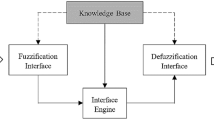Abstract
The paper presents designing and control of two-degree-of-freedom helicopter system, with two degrees of freedom. The helicopter is a combination of rotor motors which helps to lift the body of system. This is a nonlinear and unstable system in nature. The control techniques focused are adaptive neuro-fuzzy inference-PID and fuzzy-PID. Helicopter system has been analysed using MATLAB software and analysed in terms of transient response, root-mean-square error, steady-state error and total harmonic distortion analysis for performance assessment. The controllers have been designed with and without integral action.
Access this chapter
Tax calculation will be finalised at checkout
Purchases are for personal use only
Similar content being viewed by others
References
Chalupa P, Přikryl J, Novák J (2015) Modelling of twin rotor MIMO system. In: Proceedings 2015 20th international conference on process control. PC 2015, vol. 2015–July, pp. 314–319
Rotondo D, Nejjari F, Puig V (2013) Quasi-LPV modeling, identification and control of a twin rotor MIMO system. Control Eng Pract 21(6):829–846
Tastemirov A, Lecchini-Visintini A, Morales-Viviescas RM (2017) Complete dynamic model of the twin rotor MIMO system (TRMS) with experimental validation. Control Eng Pract 66(July):89–98
Paul PK, Jacob J (2017) On the modeling of twin rotor MIMO system using chirp inputs as test signals. Asian J Control 19(5):1731–1740
Juang JG, Te Huang M, Liu WK (2008) PID control using presearched genetic algorithms for a MIMO system. IEEE Trans Syst Man Cybern Part C Appl Rev 38(5):716–727
Alagoz BB, Ates A, Yeroglu C (2013) Auto-tuning of PID controller according to fractional-order reference model approximation for DC rotor control. Mechatronics 23(7):789–797
Tao CW, Taur JS, Chen YC (2010) Design of a parallel distributed fuzzy LQR controller for the twin rotor multi-input multi-output system. Fuzzy Sets Syst 161(15):2081–2103
Tao CW, Taur JS, Chang YH, Chang CW (2010) A novel fuzzy-sliding and fuzzy-integral-sliding controller for the twin-rotor multi-input multi-output system. IEEE Trans Fuzzy Syst 18(5):893–905
Jahed M, Farrokhi M (2013) Robust adaptive fuzzy control of twin rotor MIMO system. Soft Comput 17(10):1847–1860
Rahideh A, Bajodah AH, Shaheed MH (2012) Real time adaptive nonlinear model inversion control of a twin rotor MIMO system using neural networks. Eng Appl Artif Intell 25(6):1289–1297
Shaik FA, Purwar S, Pratap B (2011) Real-time implementation of Chebyshev neural network observer for twin rotor control system. Expert Syst Appl 38(10):13043–13049
Rahideh A, Hasan Shaheed M (2011) Stable model predictive control for a nonlinear system. J Franklin Inst 348(8):1983–2004
Rahideh A, Shaheed MH (2012) Constrained output feedback model predictive control for nonlinear systems. Control Eng. Pract 20(4):431–443
Mondal S, Mahanta C (2012) Adaptive second-order sliding mode controller for a twin rotor multi-input–multi-output system. IET Control Theory Appl 6(14):2157–2167
Rashad R, El-Badawy A, Aboudonia A (2017) Sliding mode disturbance observer-based control of a twin rotor MIMO system. ISA Trans 69:166–174
Yang X, Cui J, Lao D, Li D, Chen J (2014) Input shaping enhanced active disturbance rejection control for a twin rotor multi-input multi-output system (TRMS). ISA Trans 62:287–298
Haruna A, Mohamed Z, Efe M, Basri MAM (2017) Dual boundary conditional integral backstepping control of a twin rotor MIMO system. J Franklin Inst 354(15):6831–6854
Author information
Authors and Affiliations
Corresponding author
Editor information
Editors and Affiliations
Rights and permissions
Copyright information
© 2019 Springer Nature Singapore Pte Ltd.
About this paper
Cite this paper
Singh, R., Bhushan, B. (2019). Adaptive Neuro-Fuzzy-PID and Fuzzy-PID-Based Controller Design for Helicopter System. In: Mishra, S., Sood, Y., Tomar, A. (eds) Applications of Computing, Automation and Wireless Systems in Electrical Engineering. Lecture Notes in Electrical Engineering, vol 553. Springer, Singapore. https://doi.org/10.1007/978-981-13-6772-4_25
Download citation
DOI: https://doi.org/10.1007/978-981-13-6772-4_25
Published:
Publisher Name: Springer, Singapore
Print ISBN: 978-981-13-6771-7
Online ISBN: 978-981-13-6772-4
eBook Packages: EngineeringEngineering (R0)




